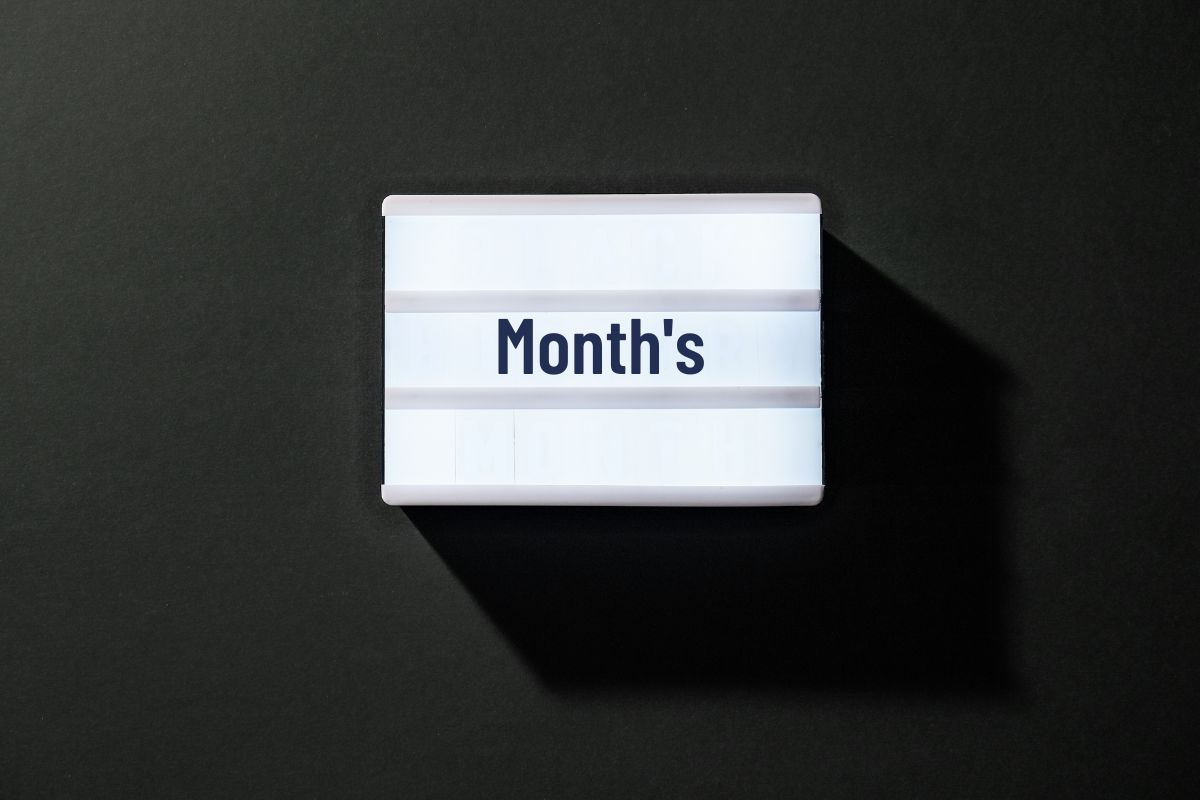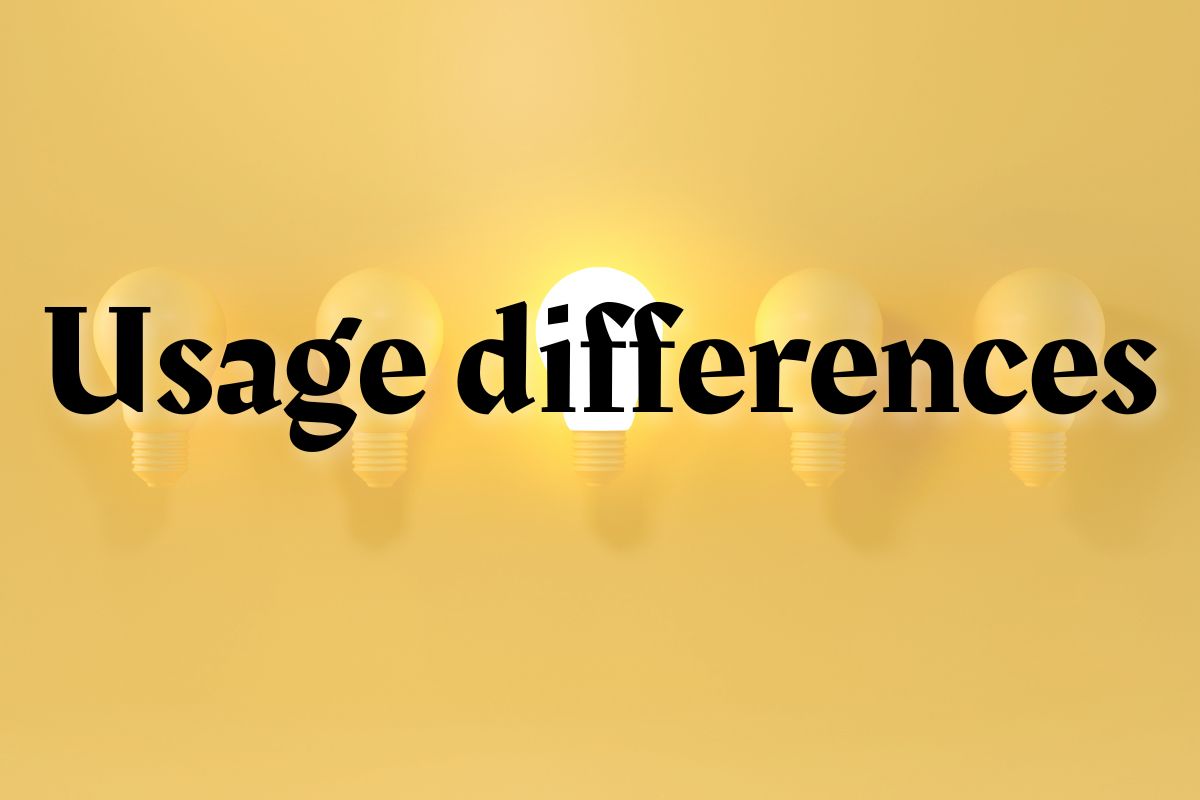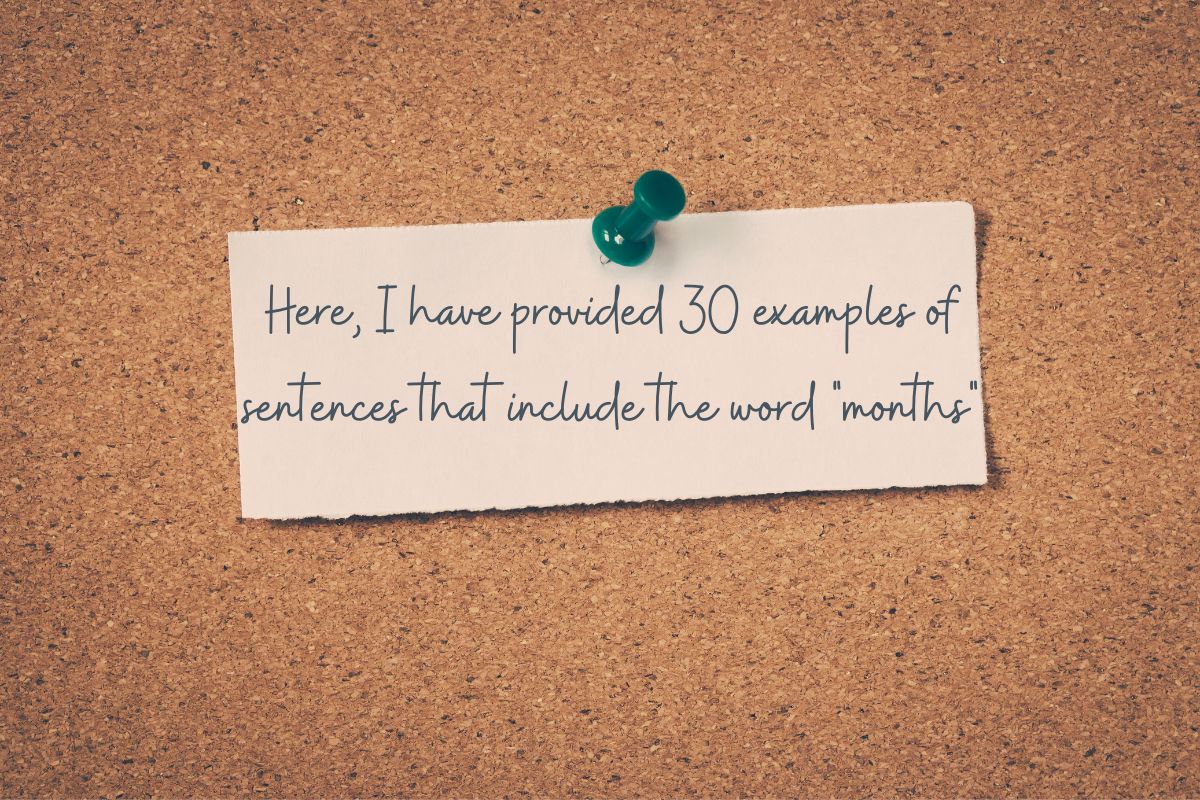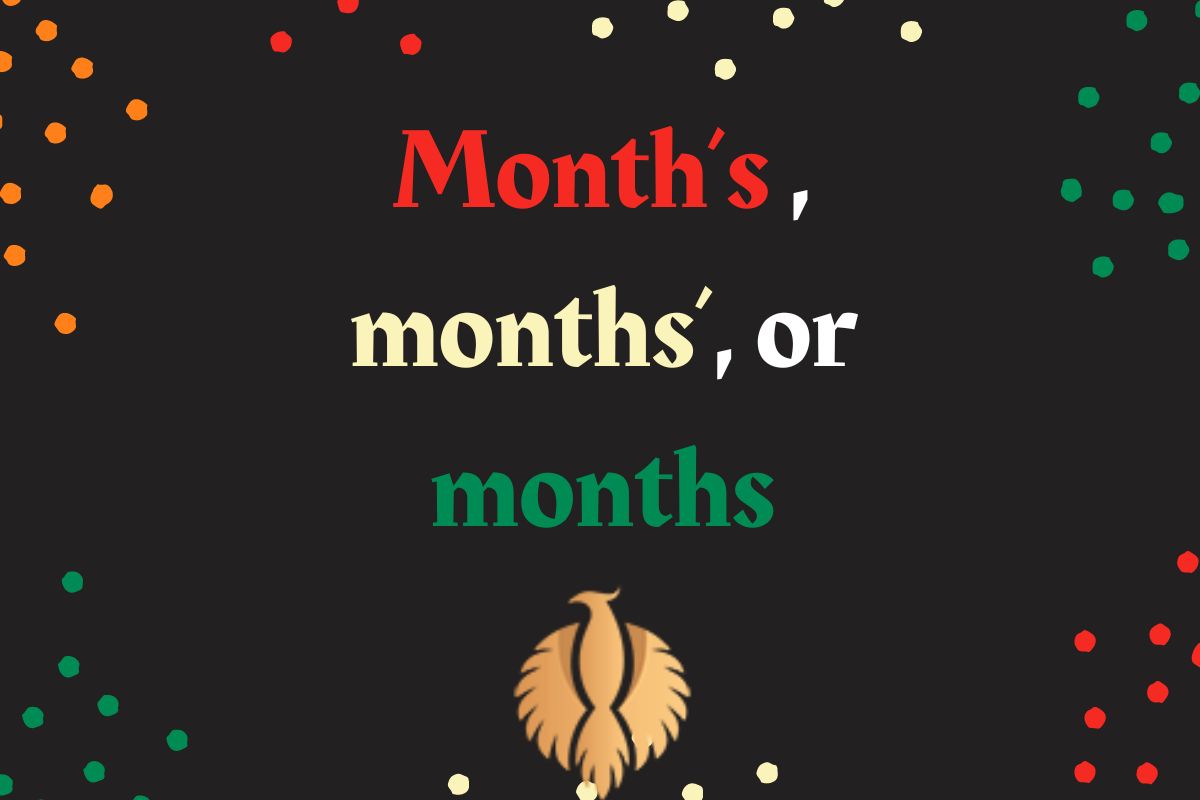In this article, I’m going to compare Months and Month’s. So keep on reading to understand the differences.
Language is a powerful tool that allows us to express ideas, concepts, and relationships. In English, the distinction between plural and possessive forms is crucial for conveying precise meanings.
One such distinction is between “months” and “month’s.” While both terms pertain to time and involve the concept of a month, they have distinct grammatical functions and convey different meanings.
This essay aims to explore the difference between “months” and “month’s” in terms of their usage, grammatical roles, and the implications they carry within sentences.
The English language, with its myriad rules and exceptions, often poses challenges for learners. Two fundamental concepts that require careful consideration are possessives and plural differences.
Understanding how to use these elements correctly is crucial for effective communication and clear expression.
You might also enjoy: Paid Vs Payed : Differences + Examples [My 2024 Teaching Way]
Possessives and Plural

Possessives convey ownership or association, indicating that one thing belongs to another. In English, the formation of possessives involves adding an apostrophe and an “s” to the noun.
For example, “the cat’s tail” denotes that the tail belongs to the cat. However, when dealing with plural nouns ending in “s,” the apostrophe alone is added after the “s,” as in “the cats’ toys.”
The distinction becomes more nuanced when addressing plural differences. Plurals, in their basic form, involve adding “s” or “es” to a singular noun, indicating more than one of that noun.
For instance, “book” becomes “books,” and “box” becomes “boxes.” Yet, when forming possessives with plural nouns, the rules differ.
For plural nouns not ending in “s,” the standard approach is to add an apostrophe and an “s.” For instance, “children” transforms into “children’s toys.”
Conversely, when the plural form already ends in “s,” the possessive only requires an apostrophe after the “s.” An example would be “the students’ project,” where the project belongs to multiple students.
Navigating the terrain of possessives and plurals also involves understanding irregular plural forms. Words like “man” become “men,” and in possessive form, “men’s room” illustrates ownership or association with the restroom for males.
Furthermore, collective nouns, which represent groups of people or things, add another layer of complexity. When referring to a collective noun as a single entity, the possessive form requires an apostrophe and “s.”
For instance, “the team’s victory” indicates that the entire team achieved success. On the other hand, when highlighting the individual contributions within the group, the possessive goes after the collective noun, as in “the team members’ efforts.”
While these rules may seem intricate, mastering possessives and plural differences significantly enhances language proficiency. Effective communication demands clarity and precision, making these grammatical concepts essential tools for expressing ideas accurately.
Therefore, possessives and plural differences are integral components of English grammar, facilitating precise communication and ensuring grammatical correctness.
Whether navigating the apostrophe placements or understanding irregular forms, a solid grasp of these concepts empowers language users to convey their thoughts with confidence and accuracy in both written and spoken communication.
You might also enjoy: Performed Vs Preformed: Which One Is Correct? + Examples [2024]
Months

The term “months” is a plural noun, denoting more than one month. It refers to a collection or group of individual months and is used to discuss time spans, periods, or recurring events. The concept of months is fundamental to our understanding of time, as it helps us organize and plan our activities throughout the year.
For example, we often refer to the twelve months of the year as “January, February, March, etc.” or “the months of the year.” Each month has its own unique characteristics, holidays, and seasonal changes, which collectively shape our annual calendar.
The division of the year into months allows us to break down time into manageable segments, making it easier to schedule events, set goals, and track progress.
In such cases, “months” serves as a noun functioning as the subject or object of a sentence, or as part of a prepositional phrase. Here are some examples to illustrate its usage:
1.Subject of a Sentence: “The months of summer are June, July, and August.” In this sentence, “months” is the subject, referring to the specific period of summer.
2.Object of a Sentence: “She spent several months traveling across Europe.” Here, “months” is the object, indicating the duration of her travels.
3.Prepositional Phrase: “We will meet in a few months.” In this example, “months” is part of the prepositional phrase “in a few months,” specifying the time frame for the meeting.
The term “months” is a plural noun, denoting more than one month. It refers to a collection or group of individual months and is used to discuss time spans, periods, or recurring events.
The concept of months is fundamental to our understanding of time, as it helps us organize and plan our activities throughout the year.
For example, we often refer to the twelve months of the year as “January, February, March, etc.” or “the months of the year.”
Each month has its own unique characteristics, holidays, and seasonal changes, which collectively shape our annual calendar. The division of the year into months allows us to break down time into manageable segments, making it easier to schedule events, set goals, and track progress.
In such cases, “months” serves as a noun functioning as the subject or object of a sentence, or as part of a prepositional phrase. Here are some examples to illustrate its usage:
1.Subject of a Sentence: “The months of summer are June, July, and August.” In this sentence, “months” is the subject, referring to the specific period of summer.
2.Object of a Sentence: “She spent several months traveling across Europe.” Here, “months” is the object, indicating the duration of her travels.
3.Prepositional Phrase: “We will meet in a few months.” In this example, “months” is part of the prepositional phrase “in a few months,” specifying the time frame for the meeting.
Month’s
On the other hand, “month’s” is a possessive form of the singular noun “month.” It indicates ownership or possession by a particular month. The apostrophe ‘s’ (‘s) is added to the noun “month” to indicate that something belongs to or is associated with that specific month.
For instance, “December’s weather was unusually cold” or “I enjoy the beauty of May’s blossoms.” In these examples, “month’s” acts as an adjective, modifying a noun and indicating a possessive relationship.
This possessive form is used to attribute certain characteristics, events, or qualities to a specific month.
On the other hand, “month’s” is a possessive form of the singular noun “month.” It indicates ownership or possession by a particular month. The apostrophe ‘s’ (‘s) is added to the noun “month” to indicate that something belongs to or is associated with that specific month.
For instance, “December’s weather was unusually cold” or “I enjoy the beauty of May’s blossoms.” In these examples, “month’s” acts as an adjective, modifying a noun and indicating a possessive relationship.
This possessive form is used to attribute certain characteristics, events, or qualities to a specific month.
Here are some additional examples to further illustrate the use of “month’s”:
1.Describing Weather: “April’s showers bring May’s flowers.” This phrase attributes the rainy weather to April and the resulting blossoms to May.
2.Highlighting Events: “October’s festivities include Halloween and Oktoberfest.” This sentence highlights the events associated with the month of October.
3.Indicating Time: “Next month’s meeting has been rescheduled.” Here, “month’s” indicates that the meeting belongs to or is scheduled for the upcoming month.
You might also enjoy: Canceled or Cancelled: Grammar + Examples + Usage [2025]
Importance of Correct Usage
Understanding the difference between “months” and “month’s” is essential for clear and effective communication. Using these terms correctly ensures that your message is understood as intended and avoids any potential confusion.
The plural form “months” is used when referring to multiple months, while the possessive form “month’s” is used to indicate something that belongs to or is associated with a specific month.
Common Mistakes and Tips to Avoid Them
A common mistake is using “months” when “month’s” is intended, or vice versa. To avoid this, remember the following tips:
- Months: Use this plural form when referring to more than one month or discussing time spans and periods.
- Month’s: Use this possessive form when indicating ownership or association with a specific month.
Here are some additional examples to further illustrate the use of “month’s”:
- Describing Weather: “April’s showers bring May’s flowers.” This phrase attributes the rainy weather to April and the resulting blossoms to May.
- Highlighting Events: “October’s festivities include Halloween and Oktoberfest.” This sentence highlights the events associated with the month of October.
- Indicating Time: “Next month’s meeting has been rescheduled.” Here, “month’s” indicates that the meeting belongs to or is scheduled for the upcoming month.
Importance of Correct Usage
Understanding the difference between “months” and “month’s” is essential for clear and effective communication. Using these terms correctly ensures that your message is understood as intended and avoids any potential confusion.
The plural form “months” is used when referring to multiple months, while the possessive form “month’s” is used to indicate something that belongs to or is associated with a specific month.
Common Mistakes and Tips to Avoid Them
A common mistake is using “months” when “month’s” is intended, or vice versa. To avoid this, remember the following tips:
- Months: Use this plural form when referring to more than one month or discussing time spans and periods.
- Month’s: Use this possessive form when indicating ownership or association with a specific month.
Month’s

On the other hand, “month’s” is a possessive form of the singular noun “month.” It indicates ownership or possession by a particular month.
The apostrophe ‘s’ (‘s) is added to the noun “month” to indicate that something belongs to or is associated with that specific month.
For instance, “December’s weather was unusually cold” or “I enjoy the beauty of May’s blossoms.” In these examples, “month’s” acts as an adjective, modifying a noun and indicating a possessive relationship.
You might also enjoy: Where Does ;How is your Day Going?; Originate From?
Usage differences

In terms of usage, “months” and “month’s” have distinct functions and meanings in the English language.
1. “Months”
The word “months” is a plural noun that refers to a period of time consisting of multiple calendar units.
It is used to indicate the collection of twelve divisions that make up a year. For example, we commonly refer to January, February, March, and so on as the months of the year.
“Months” is used to talk about a span of time that encompasses more than one month. It does not possess any possessive qualities and is simply used to denote a collection of time units.
For instance, “I will be traveling for three months” implies that the person will be away for a period of ninety days, encompassing three separate months.
2. “Month’s”
On the other hand, “month’s” is the possessive form of the word “month.” It is used to show possession of or association with a particular month.
When we use “month’s,” we are indicating that something belongs to or is associated with a specific month. For example, “This is the month’s highest temperature” implies that the highest temperature being referred to is the highest recorded during a specific month.
“Month’s” indicates ownership or possession by a singular month. It is created by adding an apostrophe and an “s” to the end of the word “month.” For example, “December’s rainfall was exceptionally high” suggests that the amount of rainfall recorded during that month was higher than usual.
The usage of “months” and “month’s” can be clarified through further examples and contexts. Consider the following sentences:
1. “I will be away for two months.” (Here, “months” refers to a duration or time span.)
2. “June’s arrival brings the summer heat.” (In this case, “June’s” denotes ownership and indicates that something is associated with the specific month of June.)
3. “The months of hard work paid off.” (Here, “months” functions as a plural noun, referring to a collection of time periods.)
4. “My birthday is in January.” (In this sentence, “January” is used as a singular noun without any possessive form.)
It is important to note that the possessive form “month’s” is primarily used with specific months or when discussing something related to a particular month.
In contrast, the plural form “months” is used when referring to a general concept of multiple months or time periods.
Therefore, the distinction between “months” and “month’s” lies in their grammatical roles and the meanings they convey.
“Months” is a plural noun used to discuss multiple months or time spans, while “month’s” is a possessive adjective indicating ownership or association with a specific month.
Understanding the difference between these terms enables us to use language more accurately and effectively, ensuring clear and precise communication.
The key difference in usage between “months” and “month’s” lies in their function and the way they convey information. “Months” refers to a span of time consisting of multiple calendar units, while “month’s” indicates possession or association with a specific month. It is important to use these terms accurately to avoid confusion and ensure proper grammar usage in our writing and speech.
You might also enjoy: He and I Or Him and I ; Correct Pronoun + Examples [2024]
Here, I have provided 30 examples of sentences that include the word “months”

1. I have been studying Spanish for several months.
2. The project is expected to take two months to complete.
3. She traveled to Europe for three months.
4. The baby started walking at ten months.
5. We haven’t seen each other in months.
6. The summer months are my favourite time of the year.
7. He has been unemployed for several months now.
8. The company’s profits have been declining for the past few months.
9. The flowers bloom in the spring months.
10. They went on a world tour for six months.
11. It took months of planning to organise the event.
12. The store will be closed for renovations for two months.
13. She has been training for the marathon for many months.
14. The movie has been in theatres for a few months.
15. The winter months can be quite cold in this region.
16. The project launch has been postponed by a few months.
17. The school year consists of nine months of classes.
18. We have been waiting for this vacation for months.
19. The company experienced a surge in sales in recent months.
20. The magazine publishes a new issue every month.
21. The festival is held during the summer months.
22. He has been working on his novel for the past six months.
23. We have been dating for two months now.
24. The temperature gradually increases in the summer months.
25. The company achieved its sales target for the past three months.
26. The baby’s development milestones are tracked in the early months.
27. The project deadline is just a couple of months away.
28. She will be traveling abroad for several months for her research.
29. The concert tickets have been sold out for months.
30. The rainy months are crucial for agriculture in this region.
These sentences showcase the usage of the word “months” to refer to time spans, durations, seasons, and various situations where multiple months are involved.
You might also enjoy: Copys or Copies: Differences + Examples [2024]
Now, I’m going to provide some examples of sentences that use the possessive form “month’s” without mentioning specific month names
1. The concert tickets for this month’s shows are selling quickly.
2. The school’s annual talent show is scheduled for next month’s event.
3. The company’s financial report for last month’s earnings was impressive.
4. We are planning a surprise party for our friend’s birthday later this month’s celebration.
5. The magazine’s cover story for this month’s issue features top fashion trends.
6. The hotel’s special promotion for this month’s bookings includes discounted rates.
7. The museum’s exhibition for this month’s art showcase is attracting art enthusiasts.
8. The store’s sale for this month’s clearance items offers significant discounts.
9. The restaurant’s menu for this month’s specials includes seasonal dishes.
10. The organisation’s newsletter for this month’s edition features success stories.
11. The library’s book club meeting for this month’s selection will be held next week.
12. The company’s employee of the month’s award went to an outstanding team member.
13. The school’s sports team is preparing for this month’s championship game.
14. The theatre’s performance for this month’s play received rave reviews.
15. The park’s event for this month’s family picnic will have games and entertainment.
16. The company’s meeting for this month’s agenda will focus on project updates.
17. The community centres workshop for this month’s gardening tips is open to all.
18. The university’s lecture for this month’s guest speaker will cover a fascinating topic.
19. The gym’s class for this month’s fitness challenge will start next week.
20. The organisation’s fundraiser for this month’s charity drive aims to raise funds for a good cause.
21. The hotel’s conference room for this month’s business meeting is spacious and well-equipped.
22. The theatre’s concert for this month’s musical performance sold out in record time.
23. The company’s training session for this month’s professional development will enhance employees’ skills.
24. The museum’s guided tour for this month’s historical exhibit will provide valuable insights.
25. The library’s program for this month’s children’s story time will feature interactive storytelling.
26. The park’s event for this month’s outdoor movie night will showcase a popular family film.
27. The restaurant’s reservation for this month’s chef’s tasting menu is highly sought after.
28. The school’s seminar for this month’s college admissions process will provide valuable guidance.
29. The organisation’s campaign for this month’s volunteer recruitment aims to make a positive impact.
30. The company’s announcement for this month’s wellness challenge encourages employees to prioritise their health.
These sentences demonstrate the usage of “month’s” to indicate possession or association with events, promotions, awards, publications, and various activities occurring within a particular month.
Conclusion
In our exploration of the differences between “months” and “month’s,” we have delved into the nuances of English grammar that distinguish these terms.
Understanding these differences is crucial for effective communication, as it ensures that our messages are clear and precise.
Language is a powerful tool that allows us to express ideas, concepts, and relationships, and mastering its intricacies enhances our ability to convey meaning accurately.
The distinction between “months” and “month’s” lies in their grammatical functions and the meanings they convey. “Months” is a plural noun that refers to multiple calendar units, used to discuss time spans, periods, or recurring events.
For example, we often refer to the twelve months of the year as “January, February, March, etc.” or “the months of the year.” This term is used to talk about a span of time that encompasses more than one month, without any possessive qualities.
On the other hand, “month’s” is the possessive form of the singular noun “month.” It indicates ownership or possession by a particular month.
The apostrophe ‘s’ (‘s) is added to the noun “month” to show that something belongs to or is associated with that specific month.
For instance, “December’s weather was unusually cold” or “I enjoy the beauty of May’s blossoms.” In these examples, “month’s” acts as an adjective, modifying a noun and indicating a possessive relationship.
The English language, with its myriad rules and exceptions, often poses challenges for learners.
Two fundamental concepts that require careful consideration are possessives and plural differences. Possessives convey ownership or association, indicating that one thing belongs to another.
In English, the formation of possessives involves adding an apostrophe and an “s” to the noun. For example, “the cat’s tail” denotes that the tail belongs to the cat. However, when dealing with plural nouns ending in “s,” the apostrophe alone is added after the “s,” as in “the cats’ toys.”
Navigating the terrain of possessives and plurals also involves understanding irregular plural forms. Words like “man” become “men,” and in possessive form, “men’s room” illustrates ownership or association with the restroom for males.
Furthermore, collective nouns, which represent groups of people or things, add another layer of complexity.
When referring to a collective noun as a single entity, the possessive form requires an apostrophe and “s.” For instance, “the team’s victory” indicates that the entire team achieved success.
On the other hand, when highlighting the individual contributions within the group, the possessive goes after the collective noun, as in “the team members’ efforts.”
While these rules may seem intricate, mastering possessives and plural differences significantly enhances language proficiency.
Effective communication demands clarity and precision, making these grammatical concepts essential tools for expressing ideas accurately.
Therefore, possessives and plural differences are integral components of English grammar, facilitating precise communication and ensuring grammatical correctness.
The usage of “months” and “month’s” can be clarified through further examples and contexts. Consider the following sentences: “I will be away for two months” (Here, “months” refers to a duration or time span), and “June’s arrival brings the summer heat” (In this case, “June’s” denotes ownership and indicates that something is associated with the specific month of June).
These examples highlight the distinct functions and meanings of the terms.
In conclusion, the terms “months” and “month’s” serve different purposes in the English language. “Months” is a plural noun used to discuss multiple months or time spans, while “month’s” is a possessive adjective indicating ownership or association with a specific month.
By understanding and using these terms correctly, we can enhance our communication skills and ensure that our messages are clear and precise.
Whether discussing time spans, seasonal changes, or specific events, knowing when to use “months” and “month’s” will help us convey our thoughts accurately and effectively. Clear communication is key, and attention to detail in grammar can make a significant difference in how our message is received and understood.

Hi, welcome to my blog! My name is Omid and I am thrilled to have you here! I am an English language teacher with 12 years of experience and hold multiple international certifications (TESOL, IELTS, TOEFL, PTE, CELTA). Additionally, I hold a PhD in Applied Linguistics with a specialization in Teaching English as a Second Language (TESL), which fuels my passion for teaching English and assisting others in mastering the language. To me, nothing is more rewarding than helping individuals enhance their English language abilities through various methods. So, let’s embark on this journey of learning English together.




